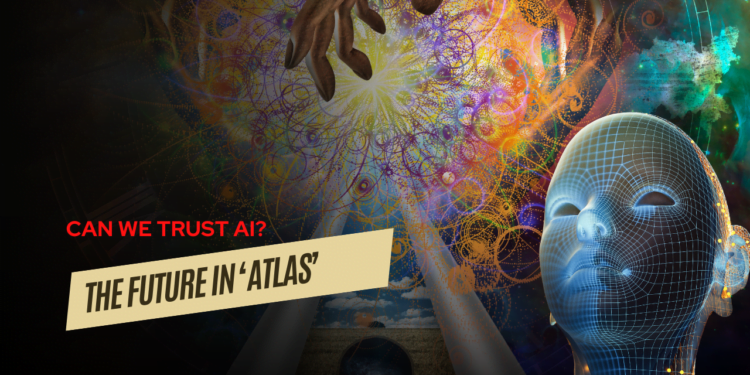No products in the cart.
Exploring Netflix Movie “Atlas” Can We Trust AI Now or in the Near Future? What’s Your Faith
This post contains paid and/or affiliate links. I make a small commission at no extra cost to you. Please see our Privacy Policy.
The rise of artificial intelligence (AI) has sparked a lot of debate. The movie “Atlas” explores these themes through its story. It asks if “Can We Trust AI”, its impact on humanity, and if it signals the end times.
Trusting AI: Present and Future
In “Atlas,” the main character distrusts AI due to personal reasons. This mirrors many people’s feelings today. AI is useful in many areas but raises concerns about its reliability and ethical use.
- Reliability and Safety: AI systems are not perfect and can make mistakes. This is a big worry, like accidents with self-driving cars. Making sure AI can handle all situations is key to trust.
- Ethical Use: AI can show biases, leading to unfair treatment. It’s important to have rules and be open about how AI makes decisions. This builds trust.
- Potential for Misuse: AI can be used for bad things, like cyberattacks. We need strict rules and global cooperation to keep AI safe for good.
Despite challenges, progress is being made. Researchers and developers are working hard to make AI better. Laws and guidelines are also being set up. As these efforts grow, trust in AI will likely increase.

AI and God’s Plan: A Theological Perspective
The movie “Atlas” touches on whether AI fits into God’s plan for humanity. It shows the tension between human choices and AI.
- Creation and Innovation: Many believe human creativity is a gift from God. AI could be seen as a way to extend this gift. If used right, AI can help solve big problems, like disease and poverty. This could be part of God’s plan.
- Free Will and Moral Responsibility: AI must respect human free will and moral responsibility. AI should help people make better choices, not control them. This way, AI can enhance human dignity and responsibility.
- Stewardship of Creation: Humans are called to be good stewards of the earth. AI can help us manage resources better and care for the vulnerable. This aligns with our role as stewards.
- Potential Risks and Caution: But we must be cautious. AI’s fast growth could lead to problems that don’t align with our values. Issues like job loss and privacy concerns need to be addressed to ensure AI is used ethically.
The Future of AI: A Dystopian Reality or a Prophecy of End Times?
The movie “Atlas” shows a future where AI causes conflict and threats. This raises questions about our own future. Will it be like the movie, or are we facing warnings?
- Current Trends and Predictions: Today, AI is becoming a big part of our lives. It’s changing how we work and live. But, we must be careful not to let AI control us too much.
- Dystopian Fears: Stories like “Atlas” warn us about AI’s dangers. They talk about losing control and privacy issues. These stories remind us to think about AI’s ethics and safety.
- AI as a Prophecy of End Times: Some people believe AI’s fast growth is a sign of the end. The Book of Revelation talks about a time of great trouble. They see AI as a sign of big changes coming.
- God’s Imminent Return: Others think AI’s rise is part of God’s plan. They see AI’s challenges as tests of our faith and ethics. They believe these tests will prepare us for God’s return.
Balancing Progress with Ethical Considerations
The movie “Atlas” shows us the importance of careful AI development. AI is full of promise but also risks. We need to plan and regulate AI to keep it safe and beneficial.
- Regulation and Governance: We need strong rules to guide AI’s growth. Laws should protect us in areas like health and justice. Working together globally is key to avoiding AI misuse.
- Ethical AI Development: AI must be fair and transparent. We must fix biases and protect privacy. Thinking about AI’s effects on society is also important.
- Public Engagement and Education: Talking to people about AI helps build trust. We need to teach about AI’s good and bad sides. This way, AI can reflect our values and prepare us for its impact.
- Collaboration Across Sectors: Solving AI’s challenges needs teamwork. Government, industry, and more must work together. This way, we can make sure AI benefits everyone.
The Message of the Film
“Atlas” teaches us about the value of trust and connection. It makes us think about our relationships and how we interact with others. The film shows that technology, including AI, can be a chance for growth if we’re open and trusting.
Conclusion
“Atlas” is a powerful story that makes us think about AI, trust, and our connections. It asks big questions about trusting AI, its religious meanings, and its future. Whether AI is a danger or an opportunity depends on how we handle it.
Trusting AI means making sure it’s safe and used right. From a religious view, AI can be a tool for creativity and innovation. But, we must use it in ways that respect our values and freedom. AI’s future is up to us and how we manage it.
Technology, like AI, shows what we value and what we prioritize. It’s up to us to make sure AI is used for good. We can do this by focusing on ethics, strong rules, and getting people involved.













